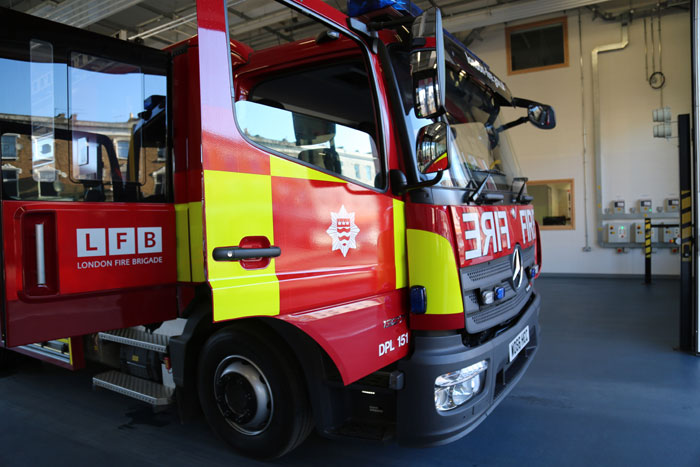This week the Brigade is rolling out a brand new model of fire engine for the first time in a decade. The new engine includes a high pressure hose which can deliver twice as much water than the previous model and a more ergonomic crew cab.
The first appliance responding to 999 calls will be at Leytonstone fire station, with a new vehicle being rolled out to stations across London over the coming months.
High pressure hoses delivering twice as much water

The new model specifications include:
- High pressure hoses delivering twice as much water than the hoses on the previous model of fire engine which means that firefighter can tackle fires more effectively.
- Electronically-controlled water pumps that can be operated with a single touch of a button.
- A different shaped 'crew cab' which will provide improved safety and comfort for firefighters.
- Extra reflective markings which will improve visibility for other road users in low light.
- Blue 'repeater' lights on the foremost front corners of the cab to make driving through heavy city traffic easier.
- EURO VI engine which further reduces emission levels compared to the previous model and complies with London's forthcoming Ultra Low Emission Zone.
London Fire Commissioner Dany Cotton said: "I'm really pleased we can now introduce this new model of fire engine which will meet the demands of a modern firefighter and keep them safe.
"Firefighters have had a big say in the design and development of the new vehicle, after all they are the ones who will be using them day in and day out to respond to everything from house fires, road traffic accidents and flooding.
"We're always looking at ways to improve our service. Ensuring our new pumping appliances are equipped with the latest technology and design features, will enable us to be even more efficient when responding to an emergency."
Emergency One (UK) Limited were subcontracted to build the new vehicles by Babcock International Group PLC who are responsible, under a twenty one year contract, for London Fire Brigade fleet maintenance and repair.
Sam White, Managing Director of Babcock International Group's Critical Services business, said: "This significant move to modernise fire appliances for London has been something we have been proud to support and has resulted in a model that is both technically advanced and better equips the needs of today's firefighter."

Crews will undergo a period of familiarisation before they use the new vehicle to respond to incidents. The new appliance will also be used to do home fire safety visits, attend community safety events and travel to specialist training exercises.
As a result fire crews could spend a couple of hours sat in the cab. With this in mind, the seating area in this newly designed engine has been built with extra space and crew comfort.
Bulky equipment - like the breathing apparatus sets, that would normally be stored behind their seats - is now being stowed in the back of the vehicle body.
The new fire engines carry 304 items on board.
As well as the traditional firefighter equipment such as axes, hosereels, ladders, and a bucket; the kit on the new appliances includes: a braille identification card, portable electronic tablet with newly improved sophisticated mapping software, eye wash, a loudhailer, oxygen masks, road traffic accident cutting equipment, a seat belt cutter and traffic cones.